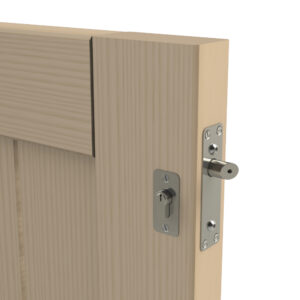Gate lock guide: Why you should choose a morticed gate lock
Everyone has come across a mortice lock because they are commonly used on regular doors. Using this type of locks on gates, however, has its own benefits and disadvantages.
Read on as we go through what a mortice lock is, where it can be used and how it compares to other lock types.
What is a morticed gate lock and when should I use it?
If you already know what a mortice lock is, you can skip this part and go straight to the next where we discuss the benefits of this lock type.
For those who aren’t aware, a morticed gate lock is known as an insert lock. This lock type is mortised into a slot in the gate frame, which hides the actual internal lock mechanism within the gate frame. You will therefore only see the handles and cylinder when the gate is locked. This makes it a very inconspicuous lock, and popular for that exact reason.

What are the benefits of a morticed gate lock?
- Inobtrusive: As we have already covered, the lock blends in thanks to the way it’s installed. This means they can be used on a variety of gate designs without sticking out. This allows you to use different types of infills, offering your customers a wide range of designs and materials for their gates.
- Customisations: You can keep the same lock and offer an array of different handles and cover plates, so that your customers can go wild with their design choices, while your lock – and your work process – stay the same.
Where are these locks used?
- Doors: this is pretty obvious, but many gates are manufactured in exactly the same configurations as inside doors, therefore, the locking system stayed the same.
- Wooden gates: the most common use for a mortice gate lock is wooden gates and frames. There aren’t too many options for such gates other than sliding bolts, surface-fixed locks, and mortice gate locks.
- Solid gates: gates with composite or timber infill are often equipped with mortice locks. This allows you to keep the design of the gate uniform, as you do not need to make a larger cut in the infill.

How do mortice gate locks compare to other alternatives?
First alternative is a morticed door lock designed for inside use. A lock is a lock, right? However, your inside door is not influenced by the weather and other elements, so the requirements to the hardware are not the same.
You have probably encountered gates that are “locked”, but can be easily open with a simple push? This is due to inadequate hardware.
As any materials shrink and expand due to hot weather, rain, snow and other elements, your gate can change shape quite a bit, but the lock needs to stay securely closed at all times. Therefore, you need a bigger latch and adjusted inside mechanics.
Moreover, the inside and outside parts of the lock need to be designed to withstand the weather – otherwise, it will go rusty and start jamming in no time. Mortice locks designed specifically for outdoor use is therefore the recommended option.
Another alternative is a bolt-on gate lock. The mortice gate lock requires three precise cut-outs on three sides of the frame to be installed, while bolt-on locks require just a few holes through the gate frame. They are therefore much easier to install than a mortice lock.
Compared to a mortice lock, bolt-on locks are bulkier, more visible and can prove more complicated if you need to cut infill around them. Most bolt-on locks do come in different types, such as digital locks or quick exit pads, offering wider flexibility.
Weld-in locks are also used often for gates that have a particular design. When a forged gate is constructed out of flat metal bars rather than box section, a weld-in lock could potentially be the only option. Mortice locks require a certain thickness in order to fit within the box section. They therefore can’t be used on frames that are smaller. For example, the ML4 requires at least a 40mm box section.
Alternatively, a weld-in lock can be used to make sure the lock box is the same width as the box section.
A morticed gate lock is obviously easier to install in such cases, as it does not require any welding, but still requires precision cuts.
Going all in with a morticed gate lock
Hopefully the above has answered your question “What is a morticed gate lock?” and given some insights into the benefits of it. In summary, mortice locks are perfect if you are after a gate lock that is discreet, can be customised and used on a variety of gate materials. If you want to learn a bit more about other lock types, check out our two other Gate Lock Guides:
